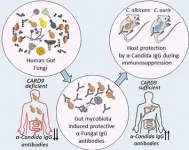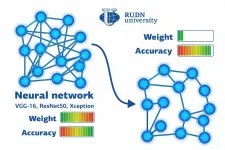Peginterferon-lambda shows strong antiviral action to accelerate clearance of COVID-19
UHN-led study indicates treatment can speed up clearance of the coronavirus in non-hospitalized patients, with potential to improve clinical outcomes and curb community spread
2021-02-06
(Press-News.org) TORONTO (February 5, 2021) - A clinical study led by Dr. Jordan Feld, a liver specialist at Toronto Centre for Liver Disease, University Health Network (UHN), showed an experimental antiviral drug can significantly speed up recovery for COVID-19 outpatients - patients who do not need to be hospitalized.
This could become an important intervention to treat infected patients and help curb community spread, while COVID-19 vaccines are rolled out this year.
"This treatment has large therapeutic potential, especially at this moment as we see aggressive variants of the virus spreading around the globe which are less sensitive to both vaccines and treatment with antibodies," says Dr. Feld, who is also Co-Director of the Schwartz Reisman Liver Research Centre and the R. Phelan Chair in Translational Liver Research at UHN.
According to the study, published today in Lancet Respiratory Medicine, patients who received a single injection of peginterferon-lambda were over four times more likely to have cleared the infection within seven days, when compared to a group treated with placebo.
"People who were treated cleared the virus quickly, and the effect was most pronounced in those with the highest viral levels. We also saw a trend towards quicker improvement of respiratory symptoms in the treatment group," explains Dr. Feld - who translated his knowledge of peg-interferon lambda usage for viral hepatitis to research on COVID-19 treatment.
Participants with higher viral levels (above 1 million copies per mL) were much more likely to clear infection with treatment than placebo: 79% in the treatment arm compared to 38% in the placebo group; and virus levels decreased quickly in everyone in the treatment group.
Treatment benefits and public health impact
Rapid clearance has many benefits, particularly in those with high viral levels, as those cases are associated with more severe disease and a higher risk of transmission to others. Among the 60 patients followed in the study, five went to emergency rooms with deteriorating respiratory symptoms. Of those, four were in the placebo group, while only one was in the group which received the actual drug.
Bringing down the virus level quickly prevents people from getting worse and likely reduces the risk of spreading the disease to others. This may have important additional public health impact.
"If we can decrease the virus level quickly, people are less likely to spread the infection to others and we may even be able to shorten the time required for self-isolation," says Dr. Feld.
Interferon-lambda
Interferon-lambda is a protein produced by the body in response to viral infections. It has the ability to activate a number of cellular pathways to kill invading viruses.
The coronavirus that causes COVID-19 prevents the body from producing interferons, which is one way it avoids being controlled by the body's immune system. Treatment with interferon-lambda activates those same virus-killing pathways in the cells.
Because interferon activates many virus-killing pathways, resistance due to 'new strains' of the virus, which could be an issue with some therapies, is not a concern with interferon-lambda.
Interferon-lambda is different from other interferons because it uses a receptor that is only present in some tissues in the body. It is very active in the lung, the liver and the intestine, all places where the COVID-19 virus is able to replicate, but it is not active in other places leading to a lot fewer side effects than other interferons. In the trial, those treated with interferon-lambda had similar side effects to those who received placebo.
Peginterferon-lambda (used in this study) is a long-acting version of the drug developed by Eiger BioPharmaceuticals, which can be given as a single injection under the skin with a tiny needle (like insulin).
Next steps
This was an investigator initiated phase 2, double-blind randomized study, done in Toronto, with a total of 60 participants - 30 who received the drug while 30 received placebo. The study was conducted from May to November 2020, with referrals from six outpatient assessment centres.
With these positive results, a large phase 3 trial is planned to start in the near future. Additional studies are ongoing at the University of Toronto, Harvard University and Johns Hopkins University with peginterferon-lambda in hospitalized patients, and in settings where it can be used to prevent infection in those who have been exposed.
INFORMATION:
Drs. Mia Biondi, nurse practitioner and researcher at UHN, Christopher Kandel, infectious disease specialist at Michael Garron Hospital, and Bettina Hansen, senior statistician at UHN, co-led this clinical trial.
Funding
This study was supported by Toronto General & Western Hospital Foundation, Toronto COVID-19 Action Initiative, University of Toronto and the Ontario First COVID-19 Rapid Research Fund. Medication was supplied by Eiger BioPharmaceuticals, Palo Alto, CA, USA.
Conflict of Interests (COI)
The authors declare no conflicts of interest.
Visual assets for media
* Photo gallery: https://photos.app.goo.gl/QUCgcGGsf8jSQo7Q7
(Drs. Jordan Feld and Mia Biondi portrayed at UHN's Francis Family Liver Clinic; Anonymous participant receiving dose of the medication; Credit: Courtesy UHN)
* B-roll: https://photos.app.goo.gl/Tf6XBu7A4hcqs1dW7
(Anonymous participant receiving dose of the medication; Credit: Courtesy UHN)
About University Health Network
University Health Network consists of Toronto General and Toronto Western Hospitals, the Princess Margaret Cancer Centre, Toronto Rehabilitation Institute, and The Michener Institute of Education at UHN. The scope of research and complexity of cases at University Health Network has made it a national and international source for discovery, education and patient care. It has the largest hospital-based research program in Canada, with major research in arthritis, cardiology, transplantation, neurosciences, oncology, surgical innovation, infectious diseases, genomic medicine and rehabilitation medicine. University Health Network is a research hospital affiliated with the University of Toronto.
For more information, visit: http://www.uhn.ca
For media inquiries, please contact:
Ana Fernandes
Senior Public Affairs Advisor, University Health Network
+1 (437) 216-4597 ana.fernandes@uhn.ca
ELSE PRESS RELEASES FROM THIS DATE:
2021-02-05
NEW YORK, NY (Feb. 5, 2020)--Cells used to study the human blood brain barrier in the lab aren't what they seem, throwing nearly a decade's worth of research into question, a new study from scientists at Columbia University Vagelos College of Physicians and Surgeons and Weill Cornell Medicine suggests.
The team also discovered a possible way to correct the error, raising hopes of creating a more accurate model of the human blood-brain barrier for studying certain neurological diseases and developing drugs that can cross it.
The study was published online Feb. ...
2021-02-05
Washington, DC, February 5, 2021 - A study in the Journal of the American Academy of Child and Adolescent Psychiatry (JAACAP), published by Elsevier, reports that in a diverse, cross-national sample of youth, physical discipline and cognitive deprivation had distinct associations with specific domains of developmental delay. The findings are based on the Multiple Indicator Cluster Surveys, which is an ongoing, international household survey initiative coordinated and assisted by the United Nations agency, UNICEF.
"Physical discipline and cognitive deprivation are well-established risks to child development. However, it is rare that these experiences are examined in relation to each other," said lead author ...
2021-02-05
UNIVERSITY PARK, Pa.-- When actor Tom Hanks announced his COVID-19 diagnosis on March 11, 2020, many Americans were still learning about the virus and its severity. According to new research, Hanks' announcement may have affected how some people understood the virus and their behavior toward its prevention.
The day after Hanks posted the news on social media, Jessica Gall Myrick, an associate professor in the Donald P. Bellisario College of Communications at Penn State, and Jessica Fitts Willoughby, associate professor at Washington State University, surveyed 682 people about their attitudes and behaviors toward COVID-19.
Just under 90% of the people surveyed had heard about Hanks' social ...
2021-02-05
Virtual reality isn't just for gaming. Researchers can use virtual reality, or VR, to assess participants' attention, memory and problem-solving abilities in real world settings. By using VR technology to examine how folks complete daily tasks, like making a grocery list, researchers can better help clinical populations that struggle with executive functioning to manage their everyday lives.
Lead author Zhengsi Chang is a PhD student that works in the lab of Daniel Krawczyk, PhD, deputy director of the Center for BrainHealth®. Along with Brandon Pires, a researcher at Texas Tech University Health Sciences Center, the team investigated whether VR can be used to effectively test ...
2021-02-05
New research affirms a unique peptide found in an Australian plant can destroy the No. 1 killer of citrus trees worldwide and help prevent infection.
Huanglongbing, HLB, or citrus greening has multiple names, but one ultimate result: bitter and worthless citrus fruits. It has wiped out citrus orchards across the globe, causing billions in annual production losses.
All commercially important citrus varieties are susceptible to it, and there is no effective tool to treat HLB-positive trees, or to prevent new infections.
However, new UC Riverside research shows that a naturally occurring peptide found in HLB-tolerant citrus relatives, such as Australian finger lime, can not only kill the bacteria that causes the disease, it can also activate the plant's ...
2021-02-05
Common fungi, often present in the gut, teach the immune system how to respond to their more dangerous relatives, according to new research from scientists at Weill Cornell Medicine. Breakdowns in this process can leave people susceptible to deadly fungal infections.
The study, published Feb. 5 in Cell, reveals a new twist in the complex relationship between humans and their associated microbes, and points the way toward novel therapies that could help combat a rising tide of drug-resistant pathogens.
The new discovery stemmed from work on inflammatory bowel disease, which often causes patients to carry larger than normal populations of fungi in their guts. ...
2021-02-05
To arrive at Nunavut, turn left at the Dakotas and head north. You can't miss it--the vast tundra territory covers almost a million square miles of northern Canada. Relatively few people call this lake-scattered landscape home, but the region plays a crucial role in understanding global climate change. New research from Soren Brothers, assistant professor in the Department of Watershed Sciences and Ecology Center, details how lakes in Nunavut could have a big impact on carbon dioxide levels in the atmosphere, and it's not all bad news--at least for now. Brothers examined 23 years of data from lakes near Rankin Inlet. He noted a peculiarity--as the lakes warmed, their carbon dioxide concentrations fell. ...
2021-02-05
A team of mathematicians from RUDN University found a way to reduce the size of a trained neural network six times without spending additional resources on re-training it. The approach is based on finding a correlation between the weights of neural connections in the initial system and its simplified version. The results of the work were published in the Optical Memory and Neural Networks journal.
The structures of artificial neural networks and neurons in a living organism are based on the same principles. Nodes in a network are interconnected; some of them receive a signal, and some transmit it by activating or suppressing the next element in the chain. The processing of any signal (for ...
2021-02-05
The discovery of an "Achilles heel" in a type of gut bacteria that causes intestinal inflammation in patients with Crohn's disease may lead to more targeted therapies for the difficult to treat disease, according to Weill Cornell Medicine and NewYork-Presbyterian investigators.
In a study published Feb. 3 in Cell Host and Microbe, the investigators showed that patients with Crohn's disease have an overabundance of a type of gut bacteria called adherent-invasive Escherichia coli (AIEC), which promotes inflammation in the intestine. Their experiments revealed ...
2021-02-05
Progressive vision loss, and eventually blindness, are the hallmarks of juvenile neuronal ceroid lipofuscinosis (JNCL) or CLN3-Batten disease. New research shows how the mutation associated with the disease could potentially lead to degeneration of light sensing photoreceptor cells in the retina, and subsequent vision loss.
"The prominence and early onset of retinal degeneration in JNCL makes it likely that cellular processes that are compromised in JNCL are critical for health and function of the retina," said Ruchira Signh, Ph.D., an associate professor in the Department of Ophthalmology and Center for Visual Science and lead author of the study which appears in the journal Communications Biology. "It is important to understand how vision loss is triggered in this disease, ...
LAST 30 PRESS RELEASES:
[Press-News.org] Peginterferon-lambda shows strong antiviral action to accelerate clearance of COVID-19
UHN-led study indicates treatment can speed up clearance of the coronavirus in non-hospitalized patients, with potential to improve clinical outcomes and curb community spread



